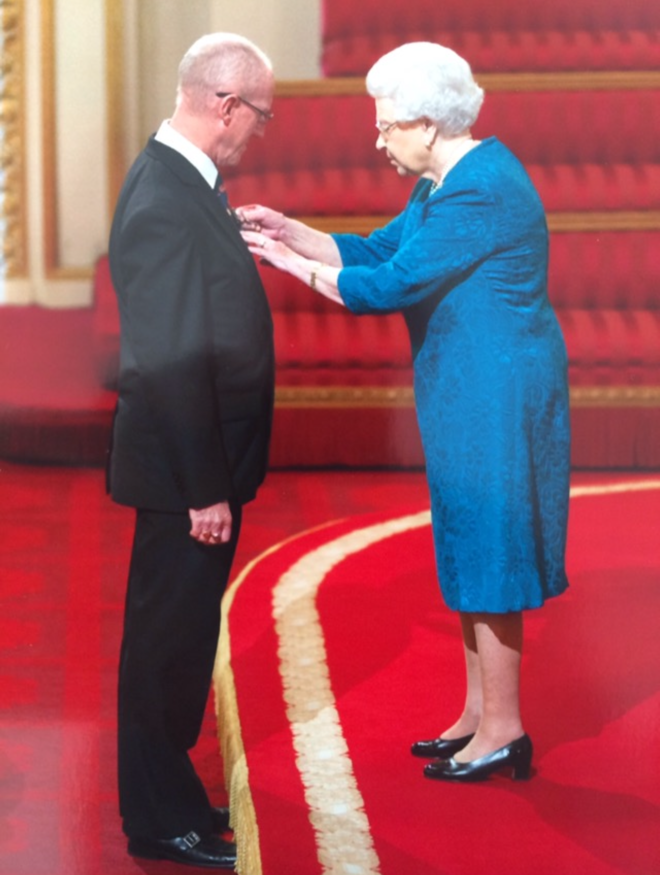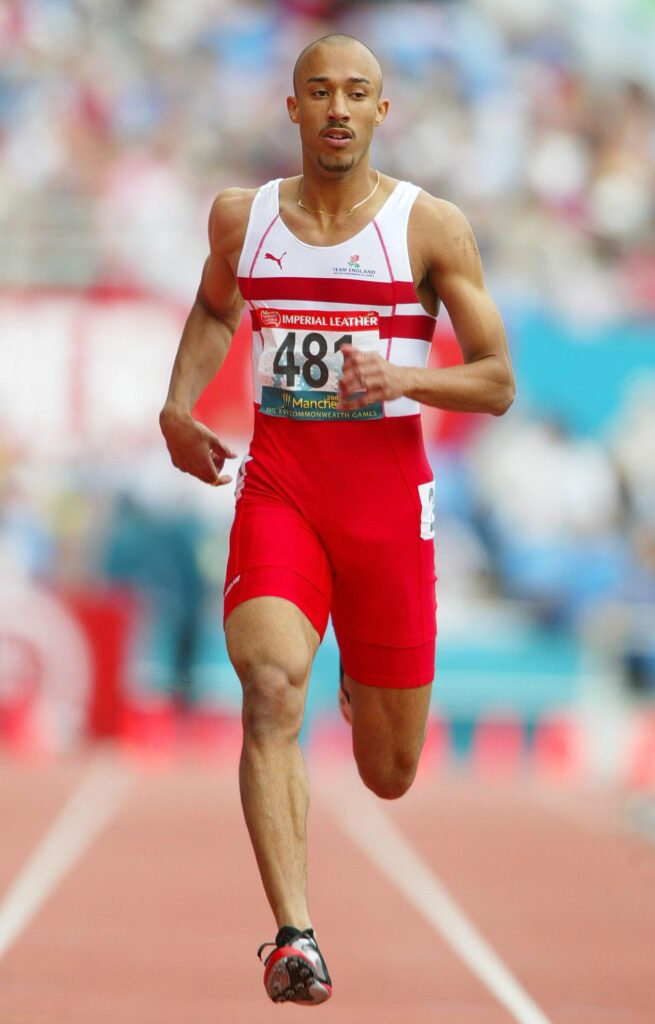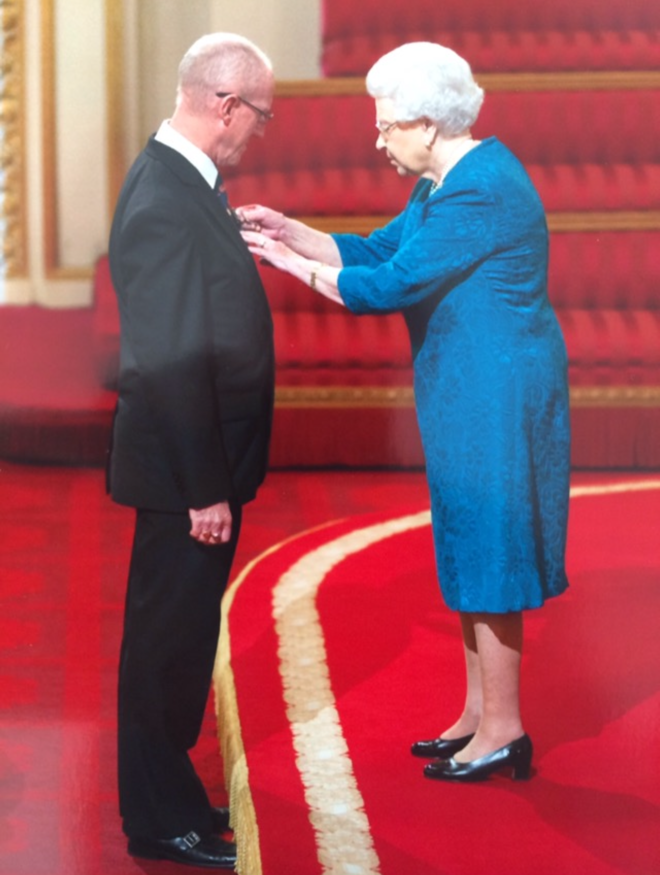Whether it’s shaping future Olympians or having them keep him alive in surgery, athletics coach John Powell MBE proves that real coaching doesn’t stop at the finish line.
John Powell MBE was an athletics sprint coach for over 45 years, travelling to international tournaments and Olympic games, all whilst plying his trade in the police force. Following his services to developing young talent and setting up his charity Met-Track, he was awarded an MBE in 2013.
This is his story.

I was sitting in my lounge on a night in 2022, awaiting critical open heart surgery, when I got a call from one of my former athletes.
“Hello, long time no speak John, I have seen on social media you are due to have an operation. Who is your doctor?”
I replied in shock, “Dr Austin.”
“Oh, I work for him. When you come in, I will be the guy working on the machine that keeps you alive.”
I had to quickly run my head back to remember if I had ever annoyed him whilst coaching him through his teens as a county standard sprinter.
After 45 years in my trade, you just never know when an athlete will pop up right in front of you and, in my case, save my life.
I was like most kids growing up, going through school, starting in athletics, but I was never star quality. It was when I left school that the coaching itch in the back of my mind was there to be scratched.
Choosing the clipboard and stopwatch over spikes and a running vest, while starting out in the Met police, seemed the right option for me.
In the 1980’s until 1993 I was the coach at Blackheath Harriers and I helped them to second in the league for three years, and for the next five we were champions.
But following a dispute over balancing the Met police with the coaching role, I switched clubs to Belgrave Harriers and for me that was the turning point: going from club regional athletics coach to an international athletics coach.

Health battle
During this time I was first diagnosed with cancer.
It was an incredibly tough time for me because I got two phone calls in a year after months of chemotherapy saying the all clear was actually not true.
I was given four to six months to live.
It was then the doctors told me they had a guy over from Canada trialling a new formula.
“John, 14 people have trialled it. One’s dead. One’s in a wheelchair and the rest are in remission. Do you want to try it?”
I replied hesitantly, “You haven’t given me much choice, have you.”
The surgery included a bone marrow transplant which almost saw me die, but I’m still here today.
Having athletes and police officers visit me in hospital was huge for me. Whenever I could sit up in my hospital bed I was there planning my 400m team for the summer season.
Athletics was my escape.
It didn’t affect my progress as a coach too much and following all this I couldn’t have imagined how far my career would go.
Sir Eddie Kulukundis financially supported the team and me so much and sent the team to Portugal for free for warm weather training. I went onto coach in the USA and that was really beneficial for me.
Around that time I started working with some really talented athletes, like Chris Lambert when he was the fastest junior in the world.

He ending up going to Harvard University but he told them he wasn’t interested unless they let him bring his own coach with him.
It was a bronze medal in the Junior World’s that put him on the map and people started talking about him.
That was when I received a call.
I ended up getting funded to coach him transatlantic for four years through major competitions.
International tournaments and the Olympics 2004/2012 were just some of the highlights from that period. But one moment stuck with me.
It was a Friday morning in the police office, after a long week, and I said to my boss, “Do you mind if I go home at lunchtime?”
He said: “No problem, you’ve been here so much.”
So I drove to Gatwick, got the next flight to Boston and watched Lambert compete on the Saturday.
Following a day flight back on the Sunday, I was back in the office for 7am Monday morning.
My boss asked whether I’d had a nice weekend, I replied “Yes it was great I went to Boston.
Shocked, he replied: “Boston Lancashire?”
“No, Boston Massachusetts” I jokingly replied.
“You are absolutely bonkers,” he said.
During my time coaching the police force were always hugely supportive, and they got their moneys worth out of me, as I only took time that was owed to me apart from one week in 2004 for the Olympics.
Unfortunately the Olympics for me were an unmitigated disaster, other than being chosen as a torch bearer.
Lambert started the race strong, racing against talents such as Frank Fredericks, when he pulled up with a hamstring injury.
He was approved to run by the medical staff but you knew it was never going to be a success.
You can’t plan ahead for injuries but coaching for me was all about knowing the athlete and knowing what buttons to press and when.

It is a complicated science. You can do group training but ultimately you have to give each individual athlete their time, monitor their progress and do the strength training.
Biomechanics is a huge part of it as well. For example you can use video feedback and draw lines from their back foot to their head and if that goes behind a bent knee, they haven’t got that full extension.

RECOGNITION
In 2013, having just arrived back from pre-season in the States, I had a brown letter awaiting for me. My first thought was “For goodness sake its the tax man, give me a break!”
Opening it to find out I had been awarded an MBE was completely out of the blue and it was absolutely amazing.
To receive that for my services to nurturing young talent and my charity met-track which focussed on getting young Londoners off the street, was just the best feeling.
At the time my wife was heavily pregnant and I had to phone and say, “Look can you do this quickly or leave it for a few months?”
They got me on the next slot in October.
I floated through the day.
It is moments like that, and having athletes keep me alive on a hospital bed years after coaching them, is just amazing.
Because it was athletics that got me through those struggles in my life.




